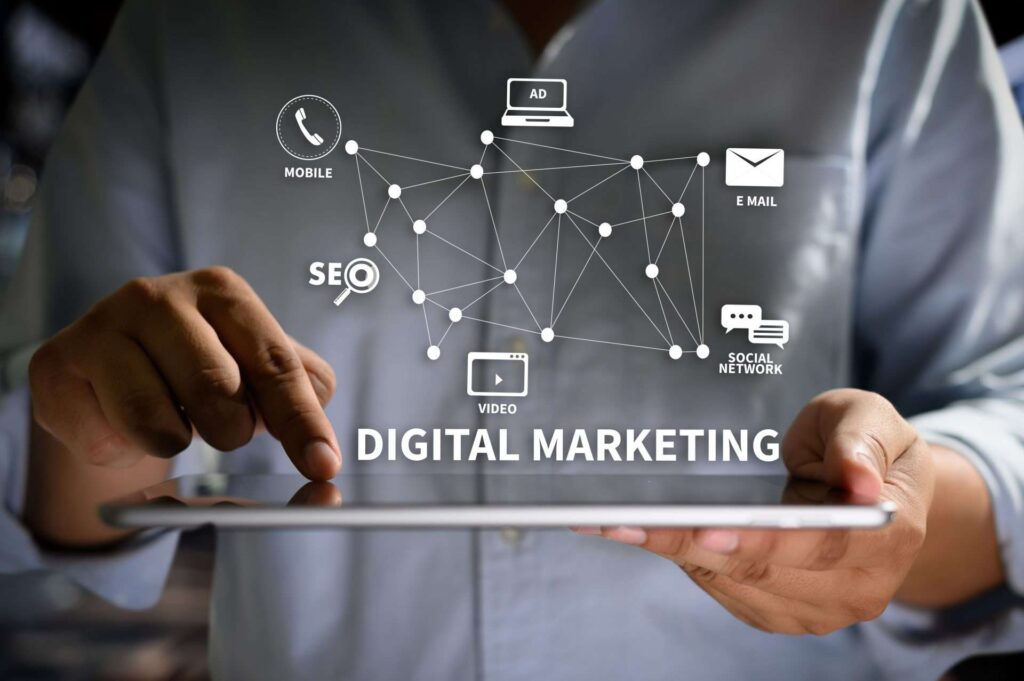In an era where consumers are increasingly connected online, digital marketing has become the cornerstone of success for businesses across all industries. This article explores the pivotal role of digital marketing in today’s business landscape, its significance, its strategies, and its impact on driving growth and revenue.
The Significance of Digital Marketing:
In the contemporary business environment, digital marketing plays a crucial role in establishing a brand presence, reaching target audiences, and driving conversions. Unlike traditional marketing channels, digital marketing offers a myriad of tools and platforms that enable businesses to connect with their customers in real time, personalize their messaging, and measure the effectiveness of their campaigns with unparalleled accuracy.
Harnessing the Power of Digital Marketing Strategies:
- Search Engine Optimization (SEO): SEO is the cornerstone of digital marketing, ensuring that businesses rank prominently in search engine results pages (SERPs) and attract organic traffic. By optimizing website content, incorporating relevant keywords, and building quality backlinks, businesses can enhance their online visibility and credibility.
- Content Marketing: Content is king in the digital realm. Through compelling and relevant content in the form of blogs, articles, videos, and infographics, businesses can engage their target audience, establish thought leadership, and drive customer loyalty.
- Social Media Marketing: With billions of active users, social media platforms have become invaluable channels for businesses to connect with their audience, build brand awareness, and drive engagement. By crafting tailored content, running targeted ads, and fostering community engagement, businesses can leverage the power of social media to amplify their reach and influence.
- Email Marketing: Despite the proliferation of digital channels, email marketing remains a potent tool for nurturing leads, retaining customers, and driving conversions. By delivering personalized and timely content directly to subscribers’ inboxes, businesses can foster meaningful relationships with their audience and drive repeat business.
- Pay-Per-Click (PPC) Advertising: PPC advertising allows businesses to bid for ad placement on search engines and websites, paying only when users click on their ads. With precise targeting options and real-time analytics, businesses can optimize their PPC campaigns to maximize ROI and drive qualified traffic to their websites.
- Analytics and Data-driven Insights: One of the key advantages of digital marketing is its ability to provide actionable insights through data analytics. By tracking key performance indicators (KPIs), analyzing customer behavior, and refining marketing strategies based on data-driven insights, businesses can continuously optimize their digital marketing efforts for maximum impact.
The Impact of Digital Marketing on Business Growth:
- Enhanced Reach and Visibility: Digital marketing enables businesses to transcend geographical boundaries and reach a global audience with minimal investment. By harnessing the power of digital channels, businesses can extend their reach far beyond traditional marketing channels and connect with potential customers wherever they are.
- Improved Targeting and Personalization: Unlike traditional marketing methods, digital marketing allows businesses to target their audience with laser-like precision based on demographics, interests, and online behavior. By delivering personalized content and offers tailored to individual preferences, businesses can foster deeper connections with their audience and drive higher conversion rates.
- Cost-effectiveness: Digital marketing offers unparalleled cost-effectiveness compared to traditional marketing channels. With targeted advertising options, pay-per-click pricing models, and the ability to track and optimize campaigns in real time, businesses can achieve a higher return on investment (ROI) with digital marketing compared to traditional advertising methods.
- Measurable Results: One of the most significant advantages of digital marketing is its measurability. Through web analytics tools, businesses can track the performance of their digital marketing campaigns in real time, allowing them to assess the effectiveness of their strategies, identify areas for improvement, and make data-driven decisions to optimize their marketing efforts.
- Increased Engagement and Customer Loyalty: Digital marketing enables businesses to engage with their audience in meaningful ways, fostering two-way communication and building lasting relationships with customers. By providing valuable content, personalized offers, and exceptional customer service across digital channels, businesses can cultivate customer loyalty and turn satisfied customers into brand advocates.

Conclusion:
In conclusion, digital marketing has emerged as a game-changer for businesses in the digital age, offering unprecedented opportunities for growth, innovation, and customer engagement. By leveraging the power of digital channels, businesses can extend their reach, connect with their audience on a deeper level, and drive sustainable growth and profitability. As technology continues to evolve and consumer behavior shifts, embracing digital marketing is no longer a choice but a necessity for businesses looking to thrive in today’s competitive landscape.
FAQs:
Q1: What are the key components of a successful digital marketing strategy?
A1: A successful digital marketing strategy encompasses a combination of SEO, content marketing, social media marketing, email marketing, PPC advertising, and data analytics to reach and engage target audiences effectively.
Q2: How can businesses measure the ROI of their digital marketing efforts?
A2: Businesses can measure the ROI of their digital marketing efforts by tracking key metrics such as website traffic, conversion rates, cost per acquisition (CPA), return on ad spend (ROAS), and customer lifetime value (CLV) using web analytics tools and marketing automation platforms.
Q3: How can small businesses compete with larger competitors in digital marketing?
A3: Small businesses can compete with larger competitors in digital marketing by focusing on niche markets, leveraging their unique selling propositions, and maximizing the use of cost-effective digital marketing tactics such as content marketing, social media marketing, and local SEO to reach and engage their target audience effectively.
Q4: What are the emerging trends in digital marketing?
A4: Some emerging trends in digital marketing include artificial intelligence (AI) and machine learning, voice search optimization, influencer marketing, interactive content, and immersive technologies such as augmented reality (AR) and virtual reality (VR).
Q5: How important is mobile optimization in digital marketing?
A5: Mobile optimization is crucial in digital marketing, considering the increasing number of users accessing the internet via mobile devices. Businesses must ensure that their websites, emails, and digital content are mobile-friendly and provide seamless user experiences across all devices to maximize engagement and conversions.
